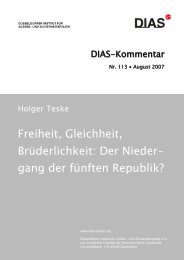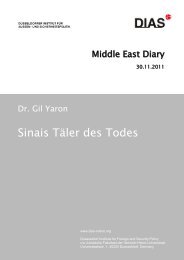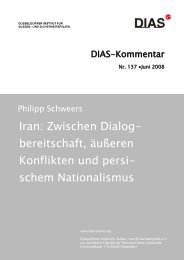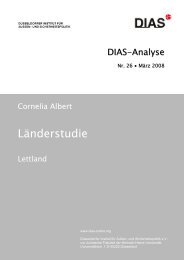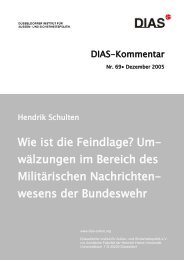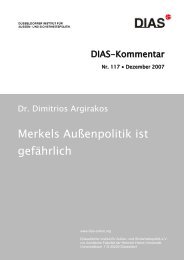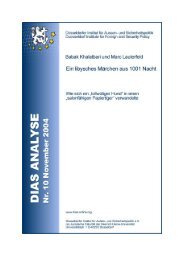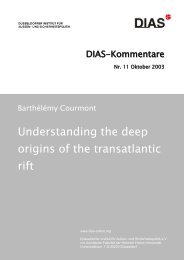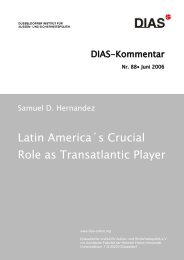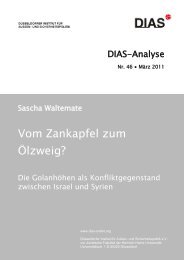NATO Collective Security or Defense - DIAS - Düsseldorfer Institut ...
NATO Collective Security or Defense - DIAS - Düsseldorfer Institut ...
NATO Collective Security or Defense - DIAS - Düsseldorfer Institut ...
Create successful ePaper yourself
Turn your PDF publications into a flip-book with our unique Google optimized e-Paper software.
Joshua Stern: <strong>NATO</strong> <strong>Collective</strong> <strong>Security</strong> <strong>or</strong> <strong>Defense</strong>: The Future of <strong>NATO</strong> in Light of Expansion and 9/11<br />
<strong>NATO</strong> <strong>Collective</strong> <strong>Security</strong> <strong>or</strong> <strong>Defense</strong>: The Future of <strong>NATO</strong> in<br />
Light of Expansion and 9/11<br />
Introduction<br />
During the Cold War <strong>NATO</strong> was the premiere security alliance in the West, yet over the last<br />
fourteen years there has been a great deal of debate about what exactly <strong>NATO</strong>‟s role should<br />
be in a post-Cold War w<strong>or</strong>ld. Originally <strong>NATO</strong> was created f<strong>or</strong> one purpose “to keep the<br />
Americans in, Germans down, and Russians out”. The alliance functioned as a collective defense<br />
<strong>or</strong>ganiza-tion, set up to defend Europe from the threat of a Soviet invasion, and maintain<br />
the transatlantic link between the United States and Europe created during W<strong>or</strong>ld War II.<br />
The alliance was suc-cessful, however when the mission was completed and the threat of a<br />
Soviet invasion disap-peared, there were fears <strong>NATO</strong> as a collective defense alliance would<br />
become obsolete.<br />
These fears translated into questions about what <strong>NATO</strong>‟s role should be in the post-Cold War<br />
w<strong>or</strong>ld. One solution was to transf<strong>or</strong>m <strong>NATO</strong> to meet the security challenges of this new<br />
w<strong>or</strong>ld. This solution sought to use the strengths <strong>NATO</strong> had built over the years (small collective<br />
group of allies, strong military capability, and ability to act with teeth) to confront the instability<br />
that resulted from the collapse of communism. This solution drew a great deal of criticism<br />
from scholars and government officials who w<strong>or</strong>ried such a role would change <strong>NATO</strong><br />
from a collec-tive defense alliance to a collective security alliance and lead to its demise.<br />
They feared the end of the Cold War would enhance tension in the alliance and undermine its<br />
effectiveness. M<strong>or</strong>eover, if <strong>NATO</strong> were to take on such contentious issues as expansion and<br />
peacekeeping these tensions would only increase and lead to disintegration.<br />
Despite this debate, very early on it became apparent <strong>NATO</strong> was going to refocus its mis-sion<br />
and deal with the security threats of a post Cold War w<strong>or</strong>ld. In 1991 at a summit in Rome<br />
<strong>NATO</strong> released the New Strategic Concept.<br />
“Risks to Allied security are less likely to result from calculate aggression against the territ<strong>or</strong>y<br />
of the Allies, but rather from the adverse consequences of instabilities that may arise from the<br />
serious economic, social, and political difficulties, including ethnic rivalries, and territ<strong>or</strong>y disputes,<br />
which are faced by many countries in Central and Eastern Europe… This could, however,<br />
lead to crises inimical to European security and even to armed conflicts, which could involve<br />
outside powers <strong>or</strong> spill over into <strong>NATO</strong> countries, and have a direct affect on the security<br />
of the Alliance”.<br />
<strong>NATO</strong> officials feared greater damage could be done to its allies and their security if <strong>NATO</strong><br />
did nothing to confront instability on its periphery. This declaration in Rome began the slow<br />
process of a fundamental change in the alliance. The alliance was no longer a collective defense<br />
alliance, but an alliance focused on w<strong>or</strong>ld security, under the assumption insecurity and<br />
de-stabilization in the w<strong>or</strong>ld (especially on its periphery) could translate to insecurity to its<br />
members.<br />
However, the 21st century has once again raised new questions and debates about <strong>NATO</strong>‟s<br />
future. The attacks on September 11, 2001 have changed the focus of security threats in the<br />
w<strong>or</strong>ld. Since 9/11, <strong>NATO</strong> has invoked article 5 of the N<strong>or</strong>th Atlantic Treaty, expanded and<br />
added seven new members, and is currently in charge of peacekeeping in Afghanistan. Despite<br />
these positives, <strong>or</strong> at least perceived positives f<strong>or</strong> the alliance, the issue of Iraq has divided<br />
the al-liance, and the initial euph<strong>or</strong>ia behind the US, “We are all Americans” , has



